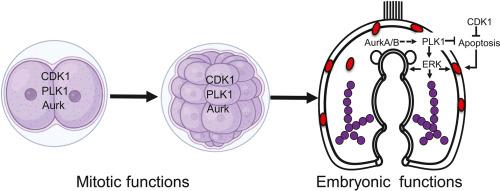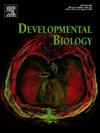参与细胞分裂的蛋白质具有广泛的发育功能。
IF 2.1
3区 生物学
Q2 DEVELOPMENTAL BIOLOGY
引用次数: 0
摘要
已知在有丝分裂中起关键作用的几种蛋白质可能在胚胎发生中具有替代功能。为了验证这一假设,我们研究了在整个发育过程中编码有丝分裂相关蛋白的转录本的空间和时间表达,包括编码运动蛋白、细胞骨架元件及其调节剂、囊泡运输和细胞周期调节剂的转录本。结果表明,这些转录本在不同的细胞类型中具有不同的表达模式。有趣的是,细胞周期蛋白依赖性激酶1 (CDK1)、波罗样激酶1 (PLK1)和极光激酶(Aurk)转录本在囊胚的内胚层细胞、体腔囊内的多能干细胞和/或未活跃分裂的原肠胚的成骨中胚层中表达。为了进一步测试对有丝分裂重要的蛋白质在胚胎发生过程中可能具有额外的功能,我们用CDK1, PLK1和Aurk抑制剂处理胚胎,导致剂量依赖性的发育停滞或延迟以及原肠胚形成,骨骼形成和上皮细胞向间质转化的缺陷。进一步分析表明,CDK1和PLK1抑制的胚胎中中胚层来源的色素细胞数量明显减少,而Aurk抑制的胚胎中中胚层来源的色素细胞数量明显增加。重要的是,在药物处理的胚胎中进行细胞增殖的色素细胞百分比与对照组没有差异,这表明CDK1、PLK1和Aurk具有额外的功能。此外,PLK1和Aurk可能调节ERK信号,影响各种发育过程。本文章由计算机程序翻译,如有差异,请以英文原文为准。

Proteins involved in cell division have broad developmental functions
Several proteins that are known to play a crucial role in mitosis may have alternative functions in embryogenesis. To test this hypothesis, we examined the spatial and temporal expression of the transcripts that encode proteins involved in mitosis throughout development, including those that encode for motor proteins, cytoskeletal elements and their modulators, vesicular transport, and cell cycle regulators. Results indicate that these transcripts have different expression patterns in various cell types. Interestingly, Cyclin Dependent Kinase 1 (CDK1), Polo Like Kinase 1 (PLK1), and Aurora kinase (Aurk) transcripts are expressed by endomesodermal cells of the blastula, the multipotent stem cells in coelomic pouches and/or the skeletogenic mesoderm of the gastrula that are not actively dividing. To further test that proteins important for mitosis may perform additional functions during embryogenesis, we treated embryos with CDK1, PLK1, and Aurk inhibitors, which resulted in a dose-dependent developmental arrest or delay and defects in gastrulation, skeletogenesis, and epithelial to mesenchymal transition. Further analysis indicates that the number of mesodermally-derived pigment cells is significantly less in CDK1 and PLK1 inhibited embryos and significantly increased in Aurk inhibited embryos. Importantly, the percentage of pigment cells undergoing cell proliferation in drug-treated embryos was not different than the control, indicating additional functions of CDK1, PLK1, and Aurk. Furthermore, PLK1 and Aurk may regulate ERK signaling to impact various developmental processes.
求助全文
通过发布文献求助,成功后即可免费获取论文全文。
去求助
来源期刊

Developmental biology
生物-发育生物学
CiteScore
5.30
自引率
3.70%
发文量
182
审稿时长
1.5 months
期刊介绍:
Developmental Biology (DB) publishes original research on mechanisms of development, differentiation, and growth in animals and plants at the molecular, cellular, genetic and evolutionary levels. Areas of particular emphasis include transcriptional control mechanisms, embryonic patterning, cell-cell interactions, growth factors and signal transduction, and regulatory hierarchies in developing plants and animals.
 求助内容:
求助内容: 应助结果提醒方式:
应助结果提醒方式:


